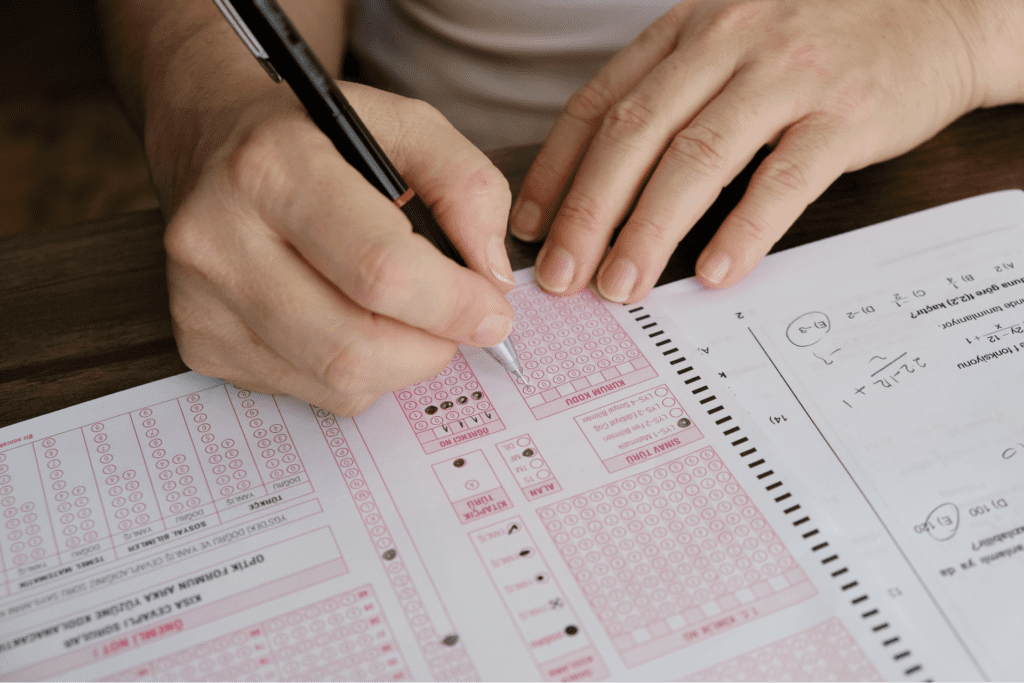Ditch the Desperation, Embrace the Preparation: Exam Prep that Gets Results

With the weight of textbooks seemingly growing heavier, the tick-tock of the clock growing louder, and exam dates drawing nearer, it’s no wonder that many students feel the pressure ramping up. Exam Prep isn’t just about cramming information last minute—it’s an art form that blends planning, strategy, and a pinch of self-belief.
This isn’t your run-of-the-mill guide about studying harder; it’s about studying smarter. We understand that every student’s journey is unique. Some might flourish in the early hours of the morning, while others find their stride at midnight. Some prefer digital notes, while others stick to good old-fashioned pen and paper. But amid these differences, there exist universal study techniques and exam preparation tips that can elevate any student’s performance.
Whether you’re gearing up for your first set of exams or refining your approach for the umpteenth time, this guide is here to offer a helping hand. Through actionable strategies and a deeper understanding of how to make every study session count, you’re not just preparing for an exam, but cultivating skills for life. So, grab your highlighter, take a deep breath, and let’s embark on this journey to academic excellence together.
Behind Every Top Grade: Discover the Secrets of an Ideal Study Space
Every journey to acing your exams begins with laying a solid foundation – your study space. It might seem simple, but the environment in which you study plays a pivotal role in your productivity and focus.
The Untold Impact of Your Study Space on Your Exam Performance
- Improved Focus: A designated study area can signal your brain that it’s “study time”, reducing the temptation of distractions and ensuring you’re fully immersed in your work.
- Better Organization: Having all your study materials in one place ensures you spend less time searching for things and more time actually studying.
- Creates Consistency: Similar to having a bedtime routine that signals your body it’s time to sleep, a study routine in a specific space conditions your mind to transition into ‘study mode’ faster.
From Clutter to Clarity: Pro Tips for an Optimal Study Space Setup
- Choose a Quiet Spot: Whether it’s a corner of your bedroom, a study, or even a local library, find a place where noise and interruptions are minimal. If you can’t find a quiet spot, consider noise-cancelling headphones or using apps that play white noise or ambient sounds to mask distracting noises.
- Comfort Matters, But Not Too Much: Your study chair should be comfortable, but not to the point that you’re tempted to nap! Ensure your table and chair maintain a good posture. Remember, a bed is for sleeping, not for serious revision.
- Lighting: Natural light is ideal as it reduces eye strain and can boost mood and productivity. However, if you’re studying at night, ensure your room is well lit, preferably with a focused study lamp.
- Keep It Organized: Have separate folders or compartments for each subject. Invest in stationery holders, use sticky notes for important reminders, and keep your space clutter-free. A tidy space often leads to a clearer mind.
- Digital and Non-digital Balance: In this digital age, while many resources are online, consider having a mix. Physical books, printed past papers, and written notes can complement your online resources. Plus, it’s good to give your eyes a break from screens.
- Personalise But Don’t Overdo: A plant, a motivational quote, or a photo of a loved one can make your study space more inviting. But remember, the aim is to reduce distractions, not add to them.
Stay Ahead with Digital: Modern Tools to Elevate Your Study Game
While traditional study techniques have their merit, leveraging technology can make your revision sessions even more productive. Consider:
- Study Apps: Apps like Quizlet can help with flashcards, while Microsoft OneNote or Evernote are great for note-taking.
- Stay Focused: To ensure you aren’t tempted by social media, use apps like ‘StayFocused‘ or ‘Freedom‘ to block distracting sites during study sessions.
Incorporating these study space tips and techniques will ensure that your environment is conducive to effective learning and preparation. Remember, the space you study in can be as vital as the actual studying when it comes to quality exam prepping.
The Silent Weapon of Top Scorers: Revealing Revision Planning Secrets
Preparing for exams isn’t just about the hours you put in; it’s about ensuring those hours are productive and effective. And at the heart of productivity lies thoughtful planning. With the right strategies, passing your exams becomes a more tangible goal.
The Power of Planning: The Gateway to Stress-Free Exams
- Stress Reduction: Knowing what to study and when can significantly reduce the anxiety of the unknown. A planned revision session offers clarity, ensuring no subject is left behind.
- Time Optimisation: Proper planning prevents cram sessions the night before an exam. Instead, you’re systematically reviewing and retaining information over time.
- Enhanced Retention: Studies suggest that spreading out study sessions over time (a method known as spaced repetition) can drastically improve long-term retention of information.
Pro Tips for Effective Revision
- Start Early: The earlier you begin your revision, the more time you have to identify areas that need more attention. This reduces last-minute cramming and boosts confidence.
- Break It Down: Divide your subjects into topics, and topics into sub-topics. This way, instead of feeling overwhelmed by an entire subject, you can tackle bite-sized pieces one at a time.
- Allocate Time Wisely: Spend more time on subjects or topics you find challenging. But remember, even if you’re good at a particular topic, it still requires some review.
- Mix It Up: Instead of studying one subject for hours on end, consider interchanging them. This technique, called interleaved practice, can enhance your ability to differentiate between solutions and choose the most appropriate one.
- Set Clear Goals: For each study session, have a clear objective. Whether it’s mastering a formula, understanding a concept, or memorising a date, knowing your goal gives direction to your revision.
- Review Regularly: Information tends to fade from memory over time. Schedule regular review sessions to reinforce what you’ve learned.
Stay Ahead with Tech: Top Tools for Seamless Study Planning
- Study Calendars: Dedicate a calendar exclusively for your revision. Highlight important dates, such as mock exams and the actual exam dates. Allocate subjects or topics to specific days.
- Study Apps: Use apps like My Study Life or Todait to plan and manage your study schedule digitally. They can send reminders, helping you stay on track.
- Priority Lists: Alongside your broader study plan, have a daily priority list. What are the top three topics you must tackle today? This provides focus and a sense of achievement as you tick them off.
Remember, while it’s important to stick to your plan, it’s equally vital to be flexible. Some days, you might grasp a concept faster than anticipated, while on others, you might need to spend a little extra time. Listen to your intuition and adjust your planning for exam preparation accordingly. The ultimate goal is comprehension and retention, not merely ticking off boxes.
Learn How to Take Notes the Right Way
Boost Your Memory Recall, Ace Your Exams
So, you’ve got your study space set up and your revision planned out. But how do you ensure that the information you’re consuming sticks? The key is to employ effective study techniques that enhance retention and comprehension, ensuring you’re truly ready for acing your exams.
The Illusion of Learning: Why Rote Memorisation Falls Short
Merely reading through notes or textbooks multiple times is passive learning. It may give an illusion of familiarity, but understanding and long-term retention can be minimal. Active learning techniques, on the other hand, engage your brain, making you more likely to remember the information.
Time Proven Tips for the Best Memory Recall
- Active Recall: Instead of merely reading, test yourself. After studying a topic, close your book and write down or verbalise everything you remember. This forces your brain to retrieve the information, strengthening neural pathways.
- The Feynman Technique: Named after physicist Richard Feynman, this technique involves teaching a concept to someone else (or even an imaginary class) in simple terms. If you can explain it simply, you truly understand it.
- Mind Mapping: Visual learners benefit from this technique. By representing information visually, you can see the relationship between ideas, helping to consolidate your understanding. For a deeper dive into this technique and other effective note-taking strategies, don’t miss our post: “The Essential Guide to Effective Note-Taking Strategies”.
- Practice with Past Papers: Familiarise yourself with the format of the exam and practice under timed conditions. This not only tests your knowledge but also improves time management skills during the actual exam.
- Chunking: Break down complex information into chunks or groups. Instead of trying to remember ten separate pieces of data, group them into two or three broader categories.
- Mnemonic Devices: Create associations for information. This could be in the form of acronyms, rhymes, or even stories. The sillier or more vivid they are, the better the retention.
- Interleaved Practice: Instead of dedicating extended periods to a single topic (blocked practice), mix up different topics in a study session. This has been shown to improve the ability to distinguish between concepts and apply them correctly.
Staying Engaged: The Key to Effective Memory Recall
While these techniques are proven to aid retention, the most crucial factor is your engagement level. Be genuinely curious about what you’re learning. Dive deeper, ask questions, and relate the information to real-world scenarios or previous knowledge. A curious and engaged mind retains information far more effectively than one that’s disinterested.
Incorporate a mix of these study techniques into your revision strategy. Remember, everyone is different. What works for one person might not work for another. It’s essential to experiment and find the methods that resonate most with you, ensuring you’re on the right path to acing your exams.
Targeted Tips That Work for Different Subjects
Every subject has its unique challenges, but the key to mastering each one lies in understanding its core demands. From the rigorous formulas in Math to the vast dates in History, each requires a tailored approach.
1. Sciences (Biology, Chemistry, Physics)
- Conceptual Mastery: It’s essential to grasp the underlying concepts. For instance, instead of just memorizing the photosynthesis process, understand why and how it occurs. Using animations or videos can be helpful for visualizing complex processes.
- Practical Application: Labs and experiments offer hands-on experience. After reading about a chemical reaction, actually performing it in a lab can cement the knowledge. Always review your observations and ensure they align with theoretical expectations.
2. Mathematics
- Understand, Don’t Memorize: For instance, instead of rote learning the quadratic formula, understand its derivation and its applications. This understanding makes it easier to recall and apply in different contexts.
- Continuous Practice: Math is all about problem-solving. The more types of problems you tackle, the more flexible your thinking becomes. For instance, after learning trigonometry, try solving real-world problems or puzzles that use these concepts. If you need more Maths help, a Maths Tutor can help you raise your grade within weeks.
3. Humanities (History, Geography)
- Narrative Learning: Instead of just dates and events, weave a story. Why did World War II happen? What were its repercussions? Turning facts into a narrative can make it more memorable.
- Linking Concepts: Use mind maps or flowcharts. For instance, while studying the Renaissance, link it to key artists, inventions, and socio-political changes of the era. To master this, our post on “The Essential Guide to Effective Note-Taking Strategies” offers deeper insights.
4. Languages
- Daily Immersion: Engage with the language daily. If you’re learning Spanish, watch Spanish movies, read books or even change your phone’s language setting. This continuous exposure enhances retention and understanding.
- Speak and Write: Practicing speaking with native speakers or writing daily journals in the language can exponentially improve proficiency. It can be as simple as describing your day or discussing a recent news event in the language you’re learning.
5. Practical Subjects (Art, Music, Physical Education)
- Routine Practice: Set aside dedicated practice hours. If you’re learning the guitar, ensure you play every day, even if just for a short while.
- Constructive Criticism: Regularly showcase your work or performance to teachers or peers. For instance, after a painting, get feedback on color combinations, techniques, or perspectives used.
6. Time Management Across Subjects
- Balance is Key: Every subject requires attention. Plan your weeks to ensure no subject gets neglected. For tips on how to balance your study schedule and maximize productivity, our post “Mastering Time Management: A Student’s Ultimate Guide” is a resource worth exploring.
Running Out of Study Time? Discover Time Management Secrets for Effective Revision
Effective revision isn’t just about what you study but also about when and how long you study. Managing your time efficiently during revision can be the difference between a stressful cramming session and a calm, well-prepared exam period.
1. Start Early and Create a Revision Timetable
- Why it Matters: Starting your revision well ahead of exam season prevents the last-minute rush. By having a timetable, you create a structured plan that covers all subjects and topics while ensuring you have breaks.
- Actionable Step: Dedicate a day to plan your revision. Mark out exam dates, allocate topics to specific days, and ensure you’ve catered time for topic revisions and full mock tests.
2. Use the Pomodoro Technique
- Why it’s Effective: This technique involves studying for 25 minutes straight and then taking a 5-minute break. It helps maintain high levels of focus and gives your mind regular short breaks to relax and process information.
- Actionable Step: Use a timer or a dedicated Pomodoro app. After four Pomodoro sessions, take a longer break of 15-20 minutes.
3. Prioritize Topics
- Why it’s Essential: Not all topics carry the same weight in exams. Some areas might be more challenging for you, while others might be more crucial from an exam point of view.
- Actionable Step: List out all topics and mark their importance based on previous papers or your understanding. Dedicate more time to high-priority or challenging subjects.
4. Avoid Multitasking
- The Reality: Contrary to popular belief, multitasking can reduce your efficiency and the quality of your work. It can also lead to increased study time and reduced retention.
- Actionable Step: Stick to one topic or subject during a study session. If you find your mind wandering, take a short break, refocus, and then continue.
5. Regular Review Sessions
- Importance: Our memory retention decreases over time. Regularly revisiting information helps to reinforce it and ensures it stays fresh in your mind.
- Actionable Step: For every major topic you cover, schedule a shorter review session a week later, then another two weeks after that.
6. Set Clear Goals for Each Session
- Why it’s Beneficial: When you have a clear objective for each study session, you’re more focused and less likely to get sidetracked.
- Actionable Step: Before starting, jot down what you aim to achieve by the end of the session, be it mastering a particular concept or finishing a set number of practice questions.
Become a Time Management Master
While these time management tips are tailored for revision, mastering time management as a whole is a skill that benefits all areas of life. If you wish to dive deeper into strategies and methods to manage your time effectively, especially as a student, don’t miss our detailed guide: “Mastering Time Management: A Student’s Ultimate Guide”.
Effective time management during revision reduces stress, increases comprehension, and ensures you’re thoroughly prepared when exam day arrives. Remember, it’s about quality, not just quantity. Efficient, focused study sessions can be more beneficial than long, unstructured hours of reading.
Ease The Exam Anxiety: Discover Game-Day Strategies
The big day has arrived. After weeks or even months of diligent preparation, you stand on the threshold of showcasing your knowledge. But exam day isn’t just about what you’ve learned; it’s also about employing strategies to ensure you perform at your best under pressure.
1. A Good Night’s Sleep is Non-Negotiable
Contrary to the popular idea of last-minute cramming, a restful night’s sleep can significantly enhance cognitive function, memory recall, and concentration. Ensure you get at least 7-9 hours of sleep the night before.
2. Nutrition Matters
Start your day with a balanced breakfast. Foods rich in protein, complex carbohydrates, and healthy fats can provide sustained energy, keeping you alert and focused. Avoid excessive caffeine or sugar, as they may lead to energy crashes.
3. Arrive Early, But Not Too Early
Being punctual allows you to settle in and reduces the risk of last-minute stress. However, arriving excessively early can lead to unnecessary waiting and increasing anxiety. Aim to reach the exam venue 15-30 minutes before the start.
4. Stay Calm and Composed
Deep breathing exercises or a brief mindfulness meditation can help calm pre-exam nerves. Remember, it’s natural to feel nervous; it’s your body’s way of saying you’re ready to face a challenge.
5. Skim Through the Paper First
Before diving into answers, take a few minutes to skim through the questions. This gives you an overview, helps in time allocation for each question, and allows you to tackle questions you’re most confident about first.
6. Manage Your Time Efficiently
Keep an eye on the clock. Allocate a specific amount of time for each question based on its weightage and complexity. If you find yourself stuck on a particular question, move on and come back to it later if time permits.
7. Read Instructions Carefully
Misinterpreting a question can be costly. Ensure you read each question thoroughly, understand what’s being asked, and then provide a concise answer.
8. Stay Hydrated and Take Short Breaks
Keep a bottle of water at hand. Staying hydrated can help with cognitive function. If permitted, take short breaks during the exam to stretch, breathe, and refocus.
9. Review Your Answers
If time allows, revisit your answers, especially those you were unsure about. Sometimes, a second look can offer a fresh perspective or catch minor errors.
With these strategies in hand, you’ll not only be equipped with the knowledge from your revision but also with the tactics to navigate the exam environment efficiently. It’s about balancing preparation with presence, ensuring that you can showcase your capabilities to the fullest on exam day.
Putting it All Together
Every student knows the challenges and anxieties that accompany exam season. The daunting piles of notes, the ticking clock, and the pressure to perform at one’s best. But as you’ve journeyed with us through this guide, it’s clear that with the right strategies, dedication, and mindset, acing your exams is entirely within your grasp.
From the importance of curating a conducive study environment to mastering diverse subjects, and from employing powerful retention techniques to navigating exam day like a pro, every step you take brings you closer to academic success. And remember, while these strategies are potent tools, your individual journey is unique. Adapt them to your strengths, address your challenges, and most importantly, believe in yourself. You’ve got this!
Yet, even the most dedicated of us might find moments when we need an extra hand. Whether it’s grasping a tricky concept or seeking motivation in the middle of a study slump, don’t hesitate to seek additional support. That’s where Tutor Wombat steps in. With our unique flat fee rate, you can access expert academic guidance without burning a hole in your pocket. As you continue to empower yourself with knowledge and strategies, know that Tutor Wombat is here to champion your academic journey every step of the way.
Maximise Your Potential with Tutor Wombat
Exams can be challenging, but with the right support, you can turn these challenges into stepping stones towards academic excellence. At Tutor Wombat, our team of seasoned tutors, boasting over 30 years of experience, have consistently driven students towards achieving remarkable results. Each student’s journey is unique, and our personalized approach ensures that your specific needs are met with precision. What’s more, with our transparent flat fee rate, you can be assured of receiving unparalleled expertise without any hidden surprises. As you’ve learnt the techniques to acing your exams, why not further enhance your academic prowess with us? Choose Tutor Wombat and unlock a world where academic success isn’t just a dream, but a reality. Dive into our extensive range of services and let’s transform your academic journey together.



